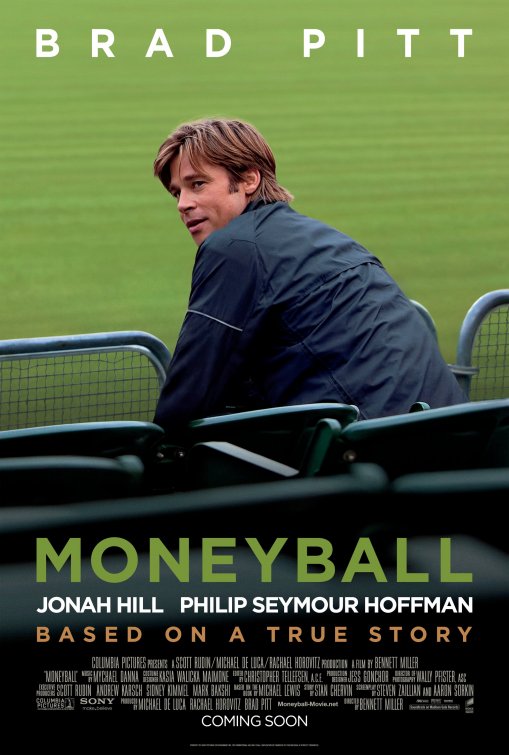
With baseball season almost upon us, it seems appropriate that the baseball drama Moneyball was nominated for six Academy Awards, including Best Picture.
Starring Brad Pitt as Oakland Athletics manager Billy Beane (a role which garnered him an Oscar nomination for Best Actor), Moneyball tells a dramatized version of the A’s 2002 season as a small market team struggling to remain competitive.
After 2001, the A’s were in trouble. The team had just lost in the first round of playoffs, and key free agents Johnny Damon, Jason Giambi and Jason Isringhausen were bought by better teams offering more money than the A’s were capable of paying. General Manager Billy Beane knew he would not be able to compete with a payroll of $40 million versus the Yankees’ $120 million, so he looked for another way to win.
Enter Peter Brand, a composite character based on the real life Paul DePodesta, played by Jonah Hill (nominated for Best Supporting Actor). Brand is a proponent of sabermetrics, an unorthodox statistical approach which identifies players who are capable of scoring, many of whom had otherwise been deemed unfit to play ball.
Beane hires Brand, they introduce their new method of scouting to vehement opposition from nearly everybody else and they build a winning team out of players who would otherwise perhaps never have made it to the big leagues.
It is a very Hollywood underdog story, and Billy Beane is a very Brad Pitt kind of character. Rough around the edges and a maverick of sorts, he has a vision that he is too impatient and unwilling to share with those around him because he knows he is right.
The movie is gripping and well-paced, most notably when the A’s are on the cusp of winning their 20th game in a row (an American League record).
However, it cannot shake itself free of Hollywood melodrama. Clichés abound, like when the movie goes into a slow motion shot of the batter’s face as he knocks the winning home run over the right field wall amid more slow motion fanfare.
That is ultimately the movie’s downfall: it is the underdog success movie we have all seen countless times before. The plot is different, with a conclusion a little less orthodox than most, and the scenario is more statistically in-depth than we’re used to in these sorts of movies, but the song remains the same.
Ultimately Beane decides against joining the Boston Red Sox because he hears a recording of his Oakland-based daughter singing for him. It is cute, it is emotional, but it is nothing new.
The movie is largely historically accurate, but while speaking to fellow baseball enthusiast Brian Stoops about the film, he was quick to point out its obvious bias:
“They make a big deal out of something that really…wasn’t a big deal.” Stoops went on to elaborate, saying the 2002 A’s were actually a pretty great team regardless of losing three star players at the beginning of the season.
All things considered, Moneyball is not a bad movie. It might even be a good movie.
As a person who loves baseball I found it rather fascinating, and it is the kind of sports movie that anyone can appreciate regardless of how they feel about the game. The script is flashy, the characters are believable and the action is intense.
Unfortunately, the film is plagued by “I-Have-Seen-This-Before” syndrome. Its loss for Best Picture at the Oscars was no disappointment.






